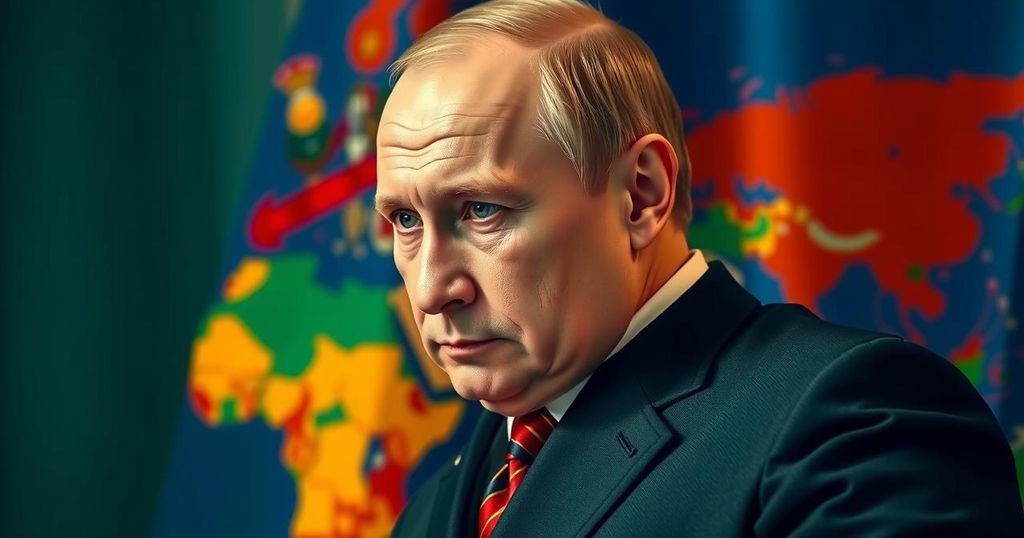Russian President Vladimir Putin has promised “total support” to African nations during a summit in Sochi, focusing on military cooperation and sustainable development. This appeal reflects a growing inclination among African governments to sever ties with Western nations, especially France, in favor of partnerships with Moscow. African leaders express a preference for Russia’s non-interventionist approach amid their struggles against terrorism and political instability.
During a recent summit in Sochi, Russian President Vladimir Putin extended what he termed “total support” to African nations, emphasizing collaboration in diverse fields such as combating terrorism, ensuring sustainable development, and addressing public health challenges. This speech was presented by Russian Foreign Minister Sergei Lavrov to various African foreign ministers, aligning with a growing trend among African governments to seek alliances with Moscow, particularly in light of their distancing from traditional Western allies. As noted by Burkina Faso’s Foreign Minister Karamoko Jean-Marie Traoré and Mali’s Foreign Minister Abdoulaye Diop, countries like Mali are fostering closer ties with Russia as they view it as a more dependable partner compared to France, the historical colonial power. Their sentiments underline a perceived sincerity in Russia’s partnership, contrasting sharply with what they describe as the “neo-colonial” attitudes of Western nations. Moreover, both ministers highlighted military cooperation as well as ventures in energy, telecommunications, technology, and mining. For instance, Mali’s intentions to deepen these partnerships with Russian companies are aimed at resolving local challenges effectively. Generally, Russian engagement in Africa is often seen as a strategic move, offering military support with a non-intervention policy in internal affairs, which appeals to several African political leaders. Despite criticisms regarding the effectiveness of Russian military operations against Islamist militancy in Burkina Faso, Mali, and Niger, Russian officials, including Foreign Ministry spokesperson Maria Zakharova, claim that these initiatives bolster Russia’s standing within Africa. Lavrov echoed this sentiment, declaring that Russia’s influence in Africa is expanding across multiple dimensions. Putin reiterated Russia’s commitment, stating, “I would like to reiterate that our country will continue to provide total support to our African friends in different sectors: ensuring sustainable development…” Such declarations reflect Russia’s strategic interest in accessing African resources, reinforcing Moscow’s position as a counterweight to Western influence on the continent. Diplomatic dynamics in Africa are evolving, with countries like Rwanda also acknowledging Russian partnerships in sectors like nuclear energy, where Rwandan officials express hopes for further collaboration. This evolving landscape necessitates a nuanced understanding from Western powers regarding their relationships with African nations, particularly those experiencing political upheaval. Ultimately, while Putin’s overtures signify an intention to solidify alliances, they simultaneously challenge the established geopolitical order, prompting Western nations to reconsider their roles in a rapidly changing African context.
The current geopolitical landscape in Africa has shifted significantly as several countries reassess their foreign alliances. Traditional ties with Western nations, particularly France, are increasingly being reevaluated in favor of partnerships with Russia. This trend arises primarily from dissatisfaction with past relationships and the desire for a collaborative framework that respects national sovereignty. The rise of jihadist attacks across the continent has prompted African nations to seek military and developmental support, making Russia an appealing alternative. Furthermore, Russia’s promise of non-interference in domestic affairs resonates with many leaders navigating their nations’ complex political landscapes. The interplay between these evolving partnerships highlights the broader global competition for influence in Africa, with various actors, including regional powers and non-Western nations, vying for strategic roles.
The summit in Sochi marks a significant moment in the shifting alliances within Africa, as Russian President Vladimir Putin’s pledge of “total support” is indicative of a broader trend of African nations seeking new partnerships beyond traditional Western influences. The emphasis on military cooperation and resource access underlines Moscow’s strategic ambitions, while African leaders’ perceptions of sincerity and non-interference appeal to their aspirations for autonomy. As the geopolitical dynamics continue to evolve, the West is urged to navigate this new paradigm thoughtfully, recognizing the need for multifaceted engagement in a rapidly transforming continent.
Original Source: www.bbc.com






